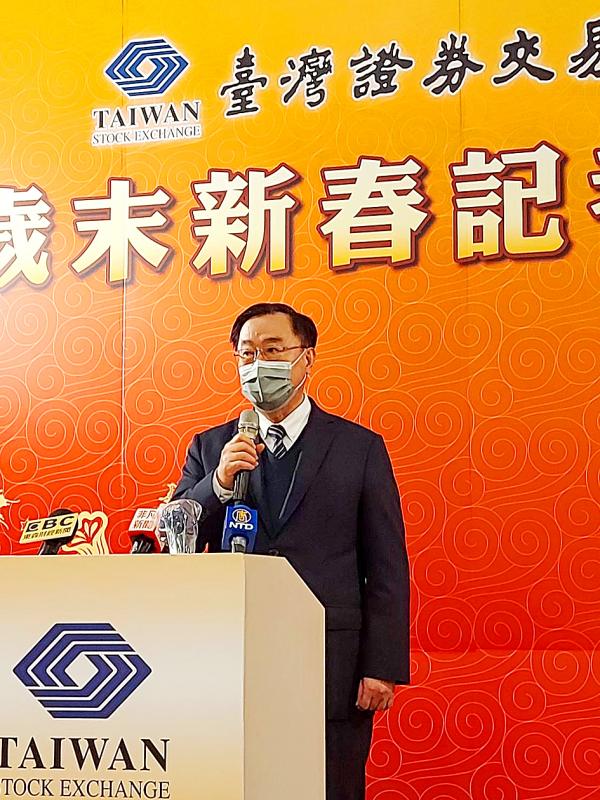The combined market value of all publicly listed companies in Taiwan grew to NT$62 trillion (US$2.24 trillion) at the end of last year, outperforming South Korean firms for the first time, Taiwan Stock Exchange (TWSE) chairman Hsu Jan-yau (許璋瑤) said yesterday.
The market value of Taiwan’s stock market ranked 16th among global bourses, Hsu said.
The combined market value of all companies listed on the TWSE grew 25 percent from NT$44.9 trillion in 2020 to NT$56.3 trillion last year, while that of all firms listed on the Taipei Exchange (TPEX) rose 31 percent to NT$5.78 trillion, exchange data showed.

Photo: Chen Yung-chi, Taipei Times
Average daily turnover advanced 95 percent annually to NT$391.4 billion, not only the highest in the local market’s history, but also the eighth-highest among global stock markets last year, exchange data showed.
Foreign institutional investors sold a net NT$454.1 billion of local shares last year, while the market cap of shares held by foreign investors to overall market value slid to 43.5 percent from 45 percent in 2020, exchange data showed.
“Although foreign institutional investors sold more than NT$1 trillion in net local shares over the past two years, local stocks still advanced, as the impact was offset by purchases by local investors,” Hsu said.
A total of 770,000 investors opened trading accounts last year, up 15 percent year-on-year, exchange data showed.
Hsu holds an upbeat outlook for local equities this year, citing their high dividend yields and low price-to-earnings ratios, and the Taiwanese economy’s expected growth of 4 percent this year.
However, there are elements of uncertainty, such as the COVID-19 pandemic, inflation and rate hikes, he added.
The TWSE would continue to seek start-ups and high-potential companies to list on the Taiwan Innovation Board, Hsu said, adding that he aims to have 10 firms listed on the new board.
Although few firms were last year interested in the new board, 30 companies applied to list their shares on the main board, the highest since 2017, he added.
The overall amount of funds raised in initial public offerings surged 198 percent from a year earlier to NT$25 billion, the highest since 2017, while funds raised in second public offerings rose 127 percent annually to NT$177.7 billion, also the highest since 2017, exchange data showed.

SEEKING CLARITY: Washington should not adopt measures that create uncertainties for ‘existing semiconductor investments,’ TSMC said referring to its US$165 billion in the US Taiwan Semiconductor Manufacturing Co (TSMC, 台積電) told the US that any future tariffs on Taiwanese semiconductors could reduce demand for chips and derail its pledge to increase its investment in Arizona. “New import restrictions could jeopardize current US leadership in the competitive technology industry and create uncertainties for many committed semiconductor capital projects in the US, including TSMC Arizona’s significant investment plan in Phoenix,” the chipmaker wrote in a letter to the US Department of Commerce. TSMC issued the warning in response to a solicitation for comments by the department on a possible tariff on semiconductor imports by US President Donald Trump’s

The government has launched a three-pronged strategy to attract local and international talent, aiming to position Taiwan as a new global hub following Nvidia Corp’s announcement that it has chosen Taipei as the site of its Taiwan headquarters. Nvidia cofounder and CEO Jensen Huang (黃仁勳) on Monday last week announced during his keynote speech at the Computex trade show in Taipei that the Nvidia Constellation, the company’s planned Taiwan headquarters, would be located in the Beitou-Shilin Technology Park (北投士林科技園區) in Taipei. Huang’s decision to establish a base in Taiwan is “primarily due to Taiwan’s talent pool and its strength in the semiconductor

An earnings report from semiconductor giant and artificial intelligence (AI) bellwether Nvidia Corp takes center stage for Wall Street this week, as stocks hit a speed bump of worries over US federal deficits driving up Treasury yields. US equities pulled back last week after a torrid rally, as investors turned their attention to tax and spending legislation poised to swell the US government’s US$36 trillion in debt. Long-dated US Treasury yields rose amid the fiscal worries, with the 30-year yield topping 5 percent and hitting its highest level since late 2023. Stocks were dealt another blow on Friday when US President Donald

UNCERTAINTY: Investors remain worried that trade negotiations with Washington could go poorly, given Trump’s inconsistency on tariffs in his second term, experts said The consumer confidence index this month fell for a ninth consecutive month to its lowest level in 13 months, as global trade uncertainties and tariff risks cloud Taiwan’s economic outlook, a survey released yesterday by National Central University found. The biggest decline came from the timing for stock investments, which plunged 11.82 points to 26.82, underscoring bleak investor confidence, it said. “Although the TAIEX reclaimed the 21,000-point mark after the US and China agreed to bury the hatchet for 90 days, investors remain worried that the situation would turn sour later,” said Dachrahn Wu (吳大任), director of the university’s Research Center for